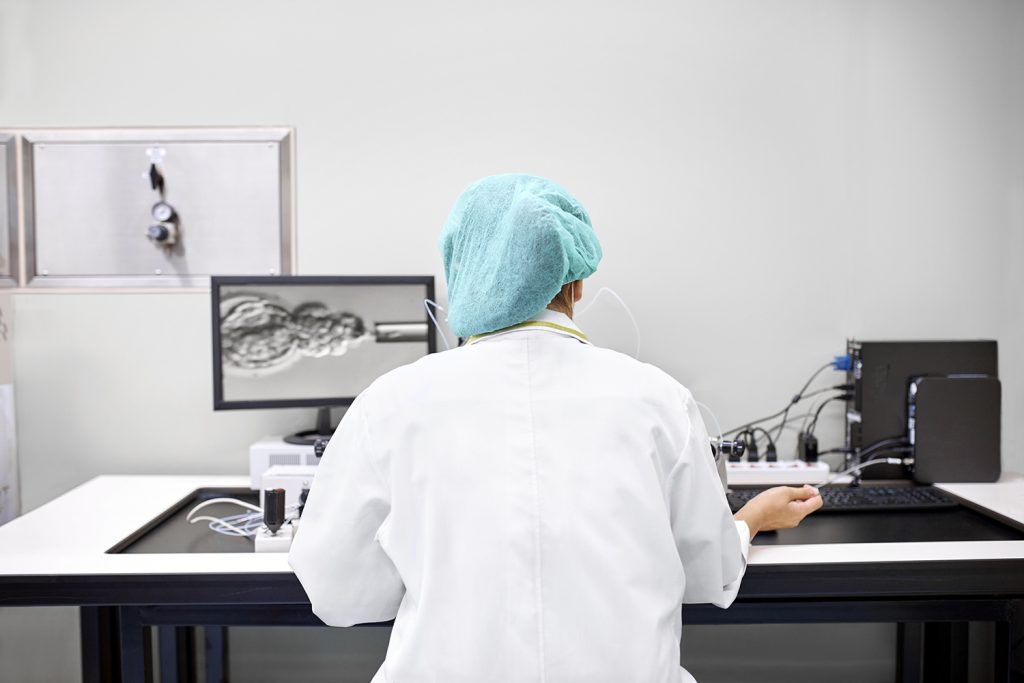For IVF excellence, trust San Diego’s experienced, dedicated team of fertility experts
In Vitro Fertilization, known as IVF, is the most common treatment used to help patients have children either using their own eggs or an egg donor and surrogate.
IVF is a multi-step process that includes:

Ovarian Stimulation
Dr. Arnold prescribes injectable hormone medications similar to the types your body naturally produces to stimulate the production of mature eggs.
Monitoring
We monitor patients through frequent blood tests and ultrasounds to assess the number and follicles as well as the thickness of the uterine lining.
Trigger Shot
To induce and control the timing of ovulation, we give the intended mother or egg donor an injection containing hCG (human chorionic gonadotropin), Lupron, or a combination of both for the final maturation of the eggs.
Egg Retrieval
Using ultrasound guidance, Dr. Arnold retrieves the eggs, after approximately 12 days of medication. Simultaneously, a fresh or frozen sperm sample is used or and the laboratory prepares sperm for IVF/ICSI.
ICSI Fertilization
Prepared sperm is injected into the mature, retrieved eggs to create embryos.
Blastocyst Culture
Blastocyst culture’ refers to culturing an embryo(s) from the Day 3 stage to Day 6. A blastocyst is the next stage in the development of an embryo and embryos should have reached this stage by Day 6.
PGT
We test embryos so the laboratory can assess if the embryos are chromosomally normal (euploid) or abnormal (aneuploid) before the embryo transfer.
Embryo Transfer
The highest-quality embryo(s) is transferred to the female patient or surrogate’s uterus in hopes of the embryo (s) implanting and developing into a healthy baby. We recommend transferring the chromosomally normal embryo and two for those desiring twins, although the embryo can split.
Frozen Embryo Transfer
In general, our laboratory will freeze viable embryos at the blastocyst stage that can be used in subsequent Frozen Embryo Transfers (FET). Increasingly, we have been freezing embryos before conducting any transfer, especially if they have reached the blastocyst stage and been tested with preimplantation genetics. This allows our patients to obtain the chromosome test results prior to the implantation. Utilizing frozen transfers also allows the intended mother’s body to rest between egg retrieval and embryo transfer. This rest phase for the uterus may lead to better success rates. Lastly, all excess embryos may be frozen and utilized in future FETs for our patients to build their families without undergoing another egg retrieval.

Most Common Reasons to Use IVF/PGT-A
Advanced Maternal Age
Women who are 35 years of age may be at risk for euploid pregnancies because of their age.
Endometriosis vs Adenomyosis
Endometriosis is scar-like tissue in places outside your uterus, while adenomyosis is actual scar tissue inside the uterus. Both can prevent fertilization and pregnancy.
Low Ovarian Reserve
Women are diagnosed with low ovarian reserve when they prematurely produce fewer eggs, lower egg quality, and eggs have more abnormalities in their chromosomes (genetic material). All these factors together mean lower pregnancy rates and higher miscarriage rates.
Male Factor Infertility
A variety of medical conditions can cause male factor infertility. It is a factor in approximately one-third of infertility cases.
Ovulatory Dysfunction
Infrequent, irregular periods or absence of ovulation requiring ovulatory medications.
Preimplantation Genetic Testing Aneuploidy (PGT-A)
We assess embryos for chromosomal abnormalities.
IVF with preimplantation genetic diagnosis testing (PGT-A) can evaluate embryos for gender and family balancing.
Third-Party Reproduction
Surrogacy and egg donation or embryo donation all require in vitro fertilization.
Tubal Disease
Some of the main causes of tubal disease are blocked fallopian tubes, ectopic pregnancies and scar tissue caused by endometriosis, and gynecological surgery. IVF was originally developed to bypass the fallopian tubes during fertilization and implantation.
Unexplained Fertility
When physicians cannot pinpoint a specific reason for an individual or couple’s failure to have a baby without IVF treatment, this may be a frustrating diagnosis for our patients.
Same-Sex Males
Gay males need IVF with egg donor and surrogacy with in vitro fertilization to create their families using sperm from one or both partners.
Preimplantation Genetic Testing (PGT-M) for Monogenic Disorders
We evaluate embryos for serious genetic diseases and disorders.
Visit Our Test Tube Baby Clinic in San Diego, CA
The California Center for Reproductive Medicine is the premier test tube baby clinic and treatment center in San Diego, California. We specialize in providing advanced reproductive solutions to help couples and individuals achieve their dreams of starting a family.
The Latest Reproductive Technology
Our state-of-the-art facility’s dedicated team of experienced fertility specialists is committed to providing personalized, compassionate care. We understand every patient is unique and tailor our treatments to meet individual needs and goals. With cutting-edge technology and the latest advancements in reproductive medicine, we offer comprehensive services to address various fertility challenges.
As a leading test tube baby clinic, we offer several assisted reproductive technologies, including in vitro fertilization (IVF), intracytoplasmic sperm injection (ICSI), preimplantation genetic testing (PGT), and egg freezing. Our highly skilled embryologists and laboratory technicians work diligently to ensure the highest quality and success rates.
We Work with You for Better Outcomes
When choosing the California Center for Reproductive Medicine, you can expect a supportive, caring environment throughout your fertility journey. Our team provides thorough evaluations, accurate diagnoses, and personalized treatment plans that optimize your chances of success. We believe in open, honest communication and are here to address your concerns or questions at every step.
Our San Diego, CA clinic offers a serene, comfortable setting for your fertility treatment. We understand the emotional and physical toll infertility can take and strive to provide a peaceful atmosphere where you can feel relaxed and supported.
If you’re searching for a trusted, reputable test tube baby treatment center in California, look no further than the California Center for Reproductive Medicine. Contact us today and take the initial stride towards starting your family by scheduling a consultation.
Factors Determining IVF Success
The CACRM clinical team and Dr. Arnold are focused on helping you achieve IVF success and bringing home a healthy baby. As part of the process for preparing you for your IVF treatment cycle, we will discuss the individual factors that will determine your success.
We understand there are many variables to the success of a take-home baby. For example:
- Quality of embryos transferred and if chromosomally normal
- Egg quality of the intended mother or egg donor
- The age of the intended mother when she is using her own eggs. IVF success rates decline as a woman ages, especially > 42 years old.
- Prior failed IVF cycle
- History of pregnancy losses or miscarriages
- Factors such as optimal body weight and healthy lifestyle habits may lower success rates
The quality of the IVF laboratory with our experienced embryologists and reproductive endocrinologist are essential components of our excellent IVF success rates. We are proud of our over 90% take-home baby rate for intended parents who undergo IVF treatment at CACRM!
